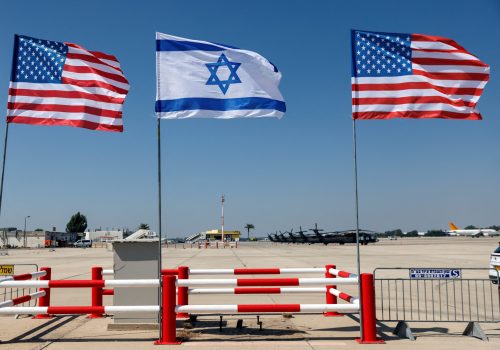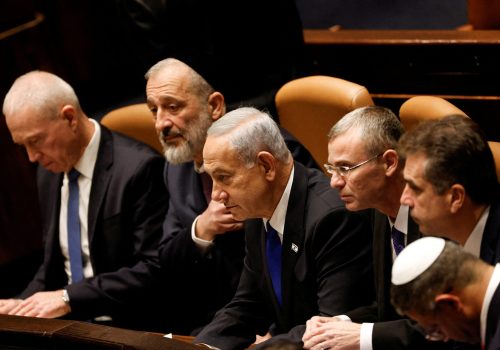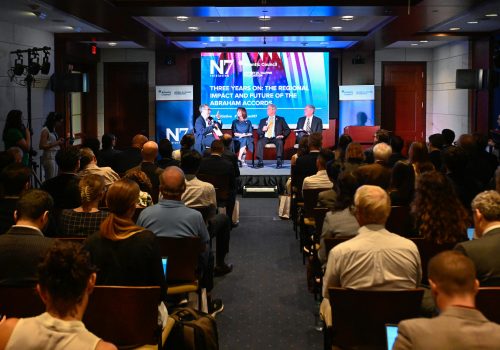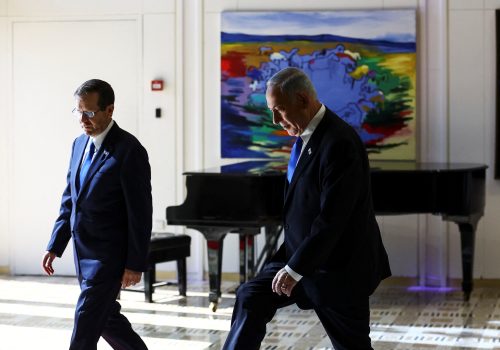Israel is joining the US Visa Waiver Program. Here’s what that means.
It’s the waive of the future. On Wednesday, the Biden administration announced that Israel will join the US Visa Waiver Program (VWP). Israelis will soon be able to visit the United States for up to ninety days without a visa. To be admitted, Israel had to extend reciprocal privileges to all US citizens without regard to national origin, religion, or ethnicity, which it committed to in July. In the past, some Palestinian Americans had been turned away from the country at Tel Aviv’s Ben Gurion Airport and other ports of entry. The decision also comes a week after US President Joe Biden met with Israeli Prime Minister Benjamin Netanyahu on the sidelines of the United Nations General Assembly in New York.
As Atlantic Council experts explain below, the visa decision is intertwined with several issues of importance in the region.
Click to jump to an expert analysis:
Thomas Warrick: A victory for citizens of both countries
Tuqa Nusairat: ‘Inclusion concerns’ remain for Palestinian and Arab Americans
Shalom Lipner: A consequential success spanning multiple Israeli leaders
A victory for citizens of both countries
The US government’s decision, announced September 27, to admit Israel to the VWP is the result of years of hard security work by US and Israeli officials. Israel will now join the program, which will allow most Israelis to travel to the United States without a visa and will allow US citizens, even those of Palestinian or Arab heritage, to travel through Israel’s main airports. While admission to the VWP is not the most important challenge facing either the United States or Israel today, this represents a victory for citizens of both countries.
The 2022 Atlantic Council issue brief by Ruth Marks Eglash and Scott Lasensky explained the challenges that had to be overcome in building ties between US and Israeli security agencies that matched those the United States has with other visa waiver countries. The Atlantic Council’s February 2023 event explained why the final steps involving reciprocity and information sharing were among the most difficult.
The credit goes to the enormous amount of hard work by government officials and civic organizations in both countries. Much of this work received very little publicity except among experts and those involved. On the US side, Secretary of Homeland Security Alejandro Mayorkas and Department of Homeland Security Under Secretary for Policy Robert Silvers deserve enormous credit for continuing to push through more obstacles than most outsiders realize. Credit also goes to the US Embassy in Israel and to ambassadors and other US diplomats for helping their Israeli colleagues through a series of changes that Israel had to make to its laws and screening practices.
Admission to the VWP is not a one-and-done process. Israel will continue to have to meet US requirements of reciprocity and information sharing that other VWP countries are also required to meet. But Wednesday’s announcement is the culmination of a lot of hard, unglamorous security work. A day of celebration is in order.
—Thomas S. Warrick is a senior fellow and director of the Future of DHS Project at the Atlantic Council. He served in the Department of State from 1997-2007 and as deputy assistant secretary for counterterrorism policy at the US Department of Homeland Security from 2008-2019.
Inclusion concerns remain for Palestinian and Arab Americans
The primary hurdle to Israel joining the VWP was its reciprocal treatment for Americans attempting to enter Israel, as a requirement of entry into the program is to admit Americans into Israel without discrimination. Americans of Palestinian and Arab descent have long faced consistent challenges when trying to enter Israel, especially when they were destined for the occupied Palestinian territories. At land and air borders, they face unreasonable questioning and intrusive searches of electronic devices. They have often been denied entry with no justification.
Over the past couple months, I have heard stories from Palestinian and Arab Americans who have been able to take advantage of the trial period to visit relatives in the West Bank and holy sites in Jerusalem, which they were not able to do before as US citizens. Still, others faced the same challenges that existed before the trial period and will likely persist after Israel’s entry into the program. Some of those Americans who argue that Israel has yet to meet the necessary requirements have joined with the American Arab Anti-Discrimination Committee (ADC) in filing a federal lawsuit against the Department of Homeland Security and Department of State over “inclusion concerns” in the program. On Tuesday, the ADC posted on social media that “[c]redible reports and ADC’s own investigations have shown that Israel failed to meet all of the legal requirements for admission.”
Wednesday’s announcement is undoubtedly a win for Netanyahu’s extremist government, which has seen the largest domestic protests in Israel’s history and increasing international criticism over its judicial reforms, which critics argue are threatening the country’s democracy. The US government should instead be investing more political capital in putting pressure on Netanyahu’s government to address the multitude of policies that continue to discriminate against Palestinians, from the ongoing occupation and expansion of settlements into Palestinian territories to the unequal treatment Palestinian Americans face when attempting to enter the country.
—Tuqa Nusairat is the director for strategy, operations, and finance at the Atlantic Council’s Rafik Hariri Center & Middle East Programs.
A consequential success spanning multiple Israeli leaders
This week’s admission of Israel into the VWP is being touted by Netanyahu as a second American feather in his cap, following on the heels of his recent (and much-awaited) meeting in New York with Biden. It does indeed deliver a consequential success—Israelis have long chafed at being refused entry into the exclusive VWP—but must also be viewed in a broader context. Efforts to promote Israel’s candidacy were shepherded by multiple officials, spanning Netanyahu’s tenure, but also those of former prime ministers Naftali Bennett and Yair Lapid. (Netanyahu, while serving as leader of the opposition, even obstructed progress on the issue, ostensibly to deny a signature achievement to his competitors.)
While Israel’s new status as VWP member stands to strengthen its relations with the United States, expectations that the doors may now be opened wider for compromise with the Palestinians—within the scope of a normalization deal with Saudi Arabia—should be tempered. The magnitude of the concessions being discussed between Washington, Jerusalem, and Riyadh comes into direct conflict with the objectives of Netanyahu’s hardline coalition partners to the extent that it could be impossible for him to consent and still maintain his hold in power.
—Shalom Lipner is a nonresident senior fellow for the Middle East Programs at the Atlantic Council.
Further reading
Wed, Feb 1, 2023
Netanyahu’s coalition isn’t built to last: Expect high sparks within and fragile prospects for Israel’s incoming government
Issue Brief By Shalom Lipner
Competing agendas between the members of Israel's incoming government portend another unsustainable partnership.
Fri, Sep 15, 2023
A Saudi-Israeli deal is not happening just yet. But there are other ways to expand the Abraham Accords.
New Atlanticist By Katherine Golden
Officials convening at the US Capitol discussed the economic and cultural projects that can expand the Accords' impact and spread prosperity in the Middle East.
Mon, Jul 17, 2023
At risk of separating, can Israel and the US renew their vows?
MENASource By Shalom Lipner
President Joe Biden is rolling out the red carpet for his Israeli counterpart, Isaac Herzog, who arrives in the United States on July 18.
Image: A view of a US flag and an Israeli flag held up by people during a demonstration to show support for US President Joe Biden, for not inviting Israeli Prime Minister Benjamin Netanyahu to the White House, in front of the US Consulate in Tel Aviv, Israel, March 30, 2023. REUTERS/Ronen Zvulun



